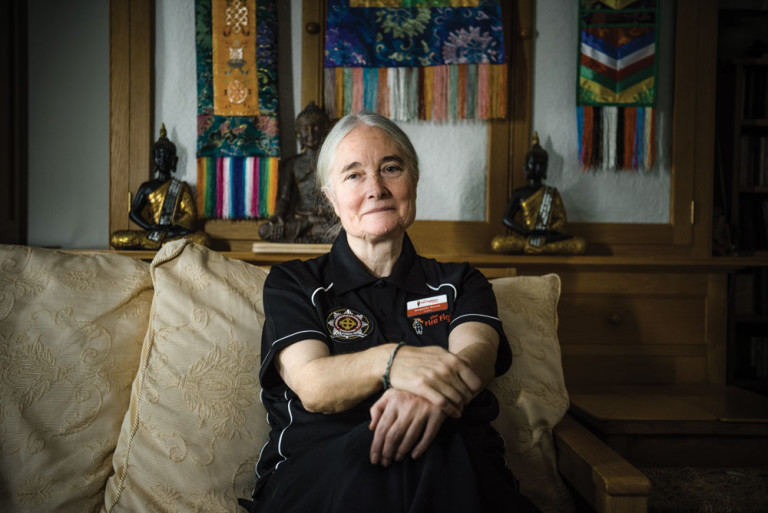Age: 61.
Profession: Fire chaplain.
Location: Kendal, England
What does a fire chaplain do? They serve the Fire and Rescue Service, as we call the fire department here. Fire chaplains complement secular support methods like counseling. We offer confidential listening to Fire Service members, for example, and some chaplains can be asked to provide support at and after incidents and emergencies. I recently received a pair of steel-toe-capped nonslip shoes to ensure my safety if called to incidents.
Sakyadhita International Association for Buddhist Women has credited you as the first-ever female Buddhist fire chaplain. How do you feel about that? Delighted, honored. I’m grateful to everybody who helped me get this wonderful opportunity. Hopefully this will inspire more women to volunteer for similar roles and show them that it’s possible for them to do so.
Did you expect the kind of attention that this has garnered? I think people are interested when you’re the first to do something. If somebody breaks a glass ceiling, it’s exciting because something new becomes achievable. Most people in the Fire Service are still men; certainly the firefighters are. I still remember when the first woman became a firefighter in the United Kingdom [in the 1970s]. When my father was a firefighter, the Service was all men.
Did your interest in becoming a fire chaplain have to do with your father? In England we see the Fire Service as a family, which includes the children of firefighters. I’m very happy that I’ve been part of that family. My father was a very safety-conscious person. Even when I was a small child, he was always teaching me about safety—how to get out of buildings, how to help younger children out, and so forth.
Is this a way, then, for you to rejoin that Fire Service family? Yes.
Yet you’ve changed that family significantly, and taken a risk in doing so. How do you view your breaking the glass ceiling at the Fire Service in the United Kingdom as it relates to other Buddhist feminist efforts across the globe? I don’t see myself as a feminist. My understanding of Buddhism is that the Buddha taught enlightenment—liberation of the mind—and men and women have an equal capacity to achieve this goal. In 40-plus years of Buddhism, I’ve always felt supported. No one has tried to obstruct me because I’m a woman.
I think everybody should be allowed to achieve their potential as long as it doesn’t harm other people. I’ve met Venerable Kusuma, who was the first bhikkhuni [fully ordained nun] in Sri Lanka in modern times. I’ve had contact with the American Tibetan Buddhist nun Thubten Chodron and the Thai bhik-khuni Venerable Dhammananda. I admire what all these women have done. I think it’s really, really good. But certainly, for me, I don’t see it as part of a feminist agenda. I see it as people fulfilling their potential. And we’ve all been very fortunate to have opportunities to break these glass ceilings.
Do you think there’s a difference of approach among Buddhist fire chaplains, as opposed to those of other religions? One thing is mindfulness—it has been discussed quite a lot in the Fire Service. As I’m sure you realize, firefighters often get exposed to dead bodies or parts of bodies, even to people dying. Such experiences can cause post-traumatic stress disorder, which if untreated can lead to suicide. Obviously there are secular responses, but Buddhists do have particular knowledge to offer on how to deal with witnessing trauma.
Also, Buddhism has its five daily remembrances: “I’m of the nature to age; I’m of the nature to get ill; I’m of the nature to die; everything will be separated from me that’s pleasing; I’m the owner of my karma.” These reflections are, of course, especially helpful for members of the Fire Service, who become so familiar with loss.
Thank you for subscribing to Tricycle! As a nonprofit, we depend on readers like you to keep Buddhist teachings and practices widely available.
